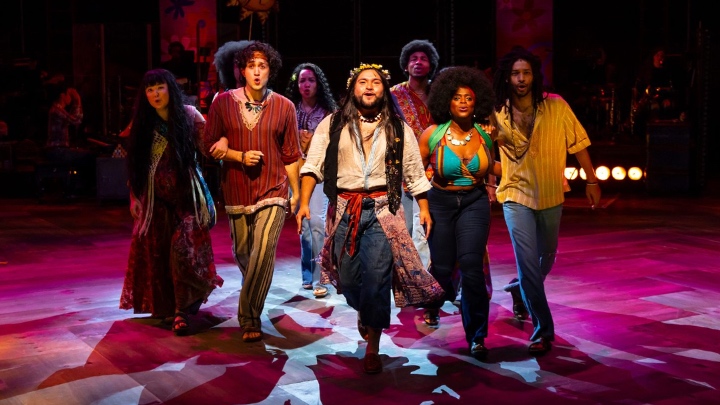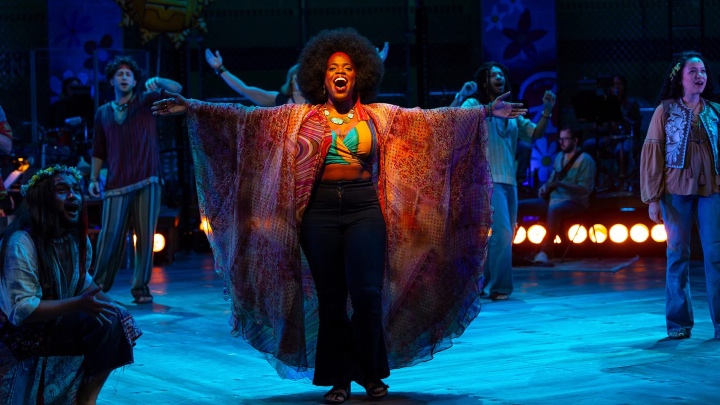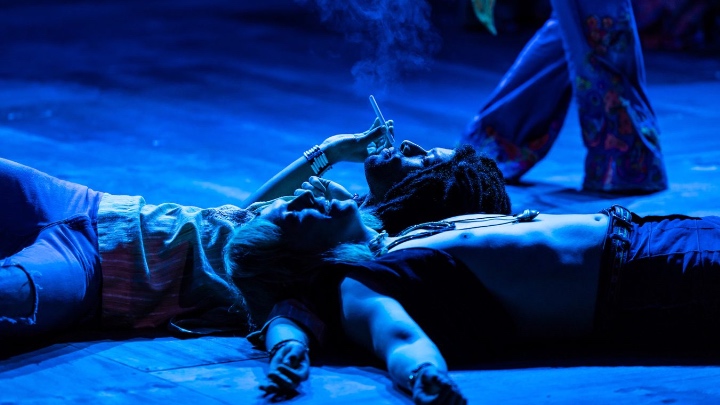Those famously nude-and-proud ensemble members must be pushing 80 or well beyond. Honorable resistance to the Vietnam War, which fueled the show’s existence and popularity, is now a matter of history; to the students I teach, they are as much part of the past as World War I or II.
And yet… those same students absolutely know about the show. Hardly any have seen it, not even in the much later and quite different film adaptation by, of all directors, Milos Forman. But their faces brighten at the title. “Oh yes — Hair. That was the cool show before Rent and Hamilton.”
Cool it certainly was. Would it remain so more than a half-century later?
Yes and no. Whether Hair is still a viable theatrical work is an open question. (There are those who think it never really was, at least not once it moved from its early underground days to Broadway.) But one aspect that has only gained in stature is the score by Galt MacDermot, with lyrics by Gerome Ragni and James Rado (both of whom also played the leading male roles). It is one of the most daring and imaginative in late 20th Century musical theater.
I sense some of you are ready to disagree. Okay, a few songs (remember “Good Morning Starshine”?) now register as a kind of hippie kitsch. But even they are delightfully tuneful. And the haunting long sequence in Act II that represents Berger’s drug-fueled hallucination about going to Vietnam is exceptionally rich, haunting, and sophisticated. A particular favorite for me is “What a Piece of Work is Man” (yes, the lyrics are Shakespeare’s from Hamlet). The piece builds from a monologue for Claude to a gorgeous ensemble. Seen and heard here—the harmonies perfectly tuned; the ensemble seated in intimate groups for a moment of tranquility amid gunfire and uncertainty—I almost burst into tears.
The superb delivery by Two River of this complex score is reason enough to see the show. A few more of my favorite moments: “Aquarius,” delivered with clarion excitement by Janelle McDermoth as Dionne (this has always been a genius show-opener); the haunting “Easy to Be Hard,” soulfully sung by Olivia Puckett as Sheila, and the snappy, insouciant “Donna” performed with swagger by Andrew Polec as Berger.
The excellent onstage band is led by Noah Teplin, with music supervision by Geoffrey Ko. They and singers maintain a good balance between preserving the original score and playfully reinventing it—the latter is something that Hair has always allowed for. For all this and more, Two River Theatre deserves our thanks for putting forward what may be the closest thing to a thoughtful, often faithful remounting of the show we’re ever likely to see.
Hair is, of course, more than just music—it’s theater. And how well it works in that context is a more complicated question. As I mentioned earlier, there considerable disagreement about how sustainable Hair was even in its early days. In his book The Season, William Goldman provocatively argued that the piece was already in decline when it opened on Broadway—a move that brought with it a more sophisticated design and a more polished and professional level of performance, but one that also paradoxically robbed Hair of its edge.
Edge is often missing here too. Director James Vásquez has staged the show creatively, with a fair amount of interaction between the cast and the audience. It’s all very good natured and cheerful, but Hair should also be disconcerting—we the audience shouldn’t feel too comforable. That shows up here in the first act only once, in “Colored Spade,” a song whose highly charged racial language still has the power to shock, and is delivered here pointedly by Tré Frazier as Hud. It’s a sense of charge that more of the show needs. Too often, it feels like a costume piece, especially early on.
But hang in there. While Hair is a show that can feel front-loaded, with most of its famous songs in Act I, it’s Act II that is more ambitious and stronger dramatically. It certainly is here. While I wish the hallucination sequence was more harrowing, it’s very effectively staged in its way. And the final moment—Claude’s “Where Do I Go?”—delivers the gut punch that we’ve been waiting for through Jordan Dobson’s harrowing performance: probably the show’s strongest.
Prior to seeing Hair at Two River, I’d concluded that the show’s afterlife would likely be in concert performances that ditch the fragmentary book entirely. I now have a different sense. Hair will always be a period piece—how could it not be? But there is enough texture and theatricality here that it should be staged and seen. Two River’s doesn’t always get there—but when it does, it’s terrific.
Photos: T Charles Erickson





